Through the Decades
2021 marks the 140th anniversary of the founding of Albany College of Pharmacy (ACP). Initially founded to help fill a void in the community healthcare landscape at a time when doctors were not always accessible, ACP has always focused on providing its students with a rigorous education that centered on graduating the highly-trained, compassionate professionals who have cared for their communities in many ways.
While the past year has been challenging, a look into the College’s history shows that ACP (and later ACPHS) graduates have always been leading the way towards ensuring the health of their communities, often serving as trusted mediators between physicians and patients, caring for all of their neighbors and dispensing advice along with prescriptions.
Many of our graduates have been trailblazers and bridge-builders, and they have always worked to safeguard their neighbors’ health. A Pharmacist’s role can take many forms—while they are most commonly thought of in a community setting, our graduates have used their skills in many ways throughout the decades. We see them on the frontlines during wars; in the development of treatments and technologies; and on the frontlines of patient care during the COVID19 pandemic.
1880’s
Sarah Simonet, Class of 1883
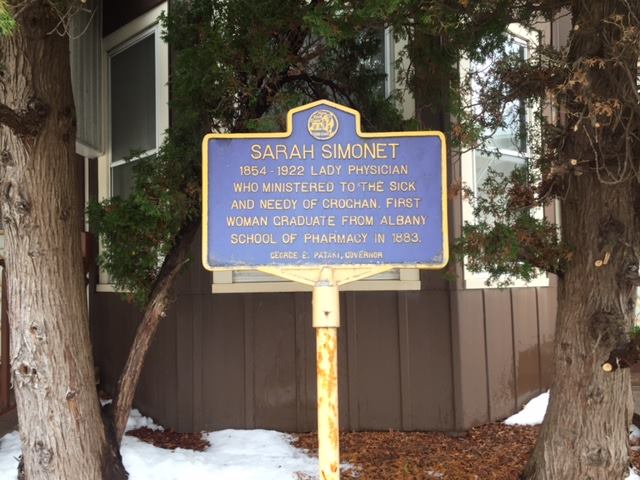
Simonet was a member of the College's inaugural class in 1881 and was the College’s first female graduate. The pharmacy program at the time was just two years, and following her graduation, Simonet returned to her home in Croghan, NY. She and her husband had started a general store, and shortly after her graduation, they added a pharmacy.
Simonet subsequently attended the University at Buffalo where she would go on to earn her medical degree. Returning to Croghan she became known as the "lady physician" and dedicated the rest of her life to treating the residents of her medically underserved area.
James Gardiner, Class of 1888
Born in 1864, just before the end of the Civil War, Gardiner was the first Black graduate of ACP. He was vice president of his class and won a cash prize of $20 from the Alumni Association for the best graduation thesis on “Percolation”. After graduation Gardiner worked in Saratoga Springs, the only Black druggist in the city at that time.
1890’s
Spanish American War
The United States declared war on Spain in April 1898 following the sinking of the battleship U.S.S Maine in Havana, Cuba. The short-lived Spanish-American War ended with the signing of the Treaty of Paris on December 10, 1898. At the 1899 Alumni Association meeting, it was noted for the record that 12 members of the Association had fought in the war.
1900’s
Burt Orrin Kinney, Class of 1901
Founder of Kinney Drugs, a pharmacy chain with over a hundred drugstores and pharmacies spread over Central and Northern New York and Vermont. Kinney opened the first store in 1903 in the town of Gouverneur, NY. In the town, he was more than just a business owner. He served on the hospital board of directors for many years. He served as a village trustee, director of the Gouverneur Savings and Loan and was a life member of the Gouverneur Lodge F & AM. He waited on customers up to six weeks before he died in 1966 at the age of 92.
1910’s
Rena Henault, Class of 1913
Women began to make their mark at the College during this decade. Henault was hired as the College’s first female teacher in 1917. She assisted Professor Edwin Hutman '91 in the Pharmacy Lab and taught Microscopy and Pharmacognosy with Dr. T.W. Jenkins.
1920’s
Francis J. O'Brien, Class of 1920
The beloved Dean was hired on as an Instructor in Pharmacy and Mathematics immediately after his graduation. By 1925, he had been promoted to Assistant Professor. In 1943, he replaced William Mansfield as dean of the College and was tasked with the difficult job of leading the school during World War II. During some of the leaner times during WWII, Dean O’Brien chose not to take his salary. He served as Dean until his retirement in 1967.
Almost every graduate who attended ACP during his tenure has a story of his dedication to and support of the student body. He is often credited with transforming the College and pharmacy as a profession, and the College continues to honor his memory to this day with the main building on campus named after him, and when he passed, dozens of alumni created an endowed Scholarship that has supported over 100 students since its founding.
1930’s
Rudolph H. Blythe, Class of 1931
Rudolph was founder of the Pharmaceutical Research division of SmithKline & French (SK&F). He joined the company in Philadelphia 1934 and retired as director, Pharmaceutical Research in 1966. Dr. Blythe invented the time-release capsule during a distinguished career as a pioneer industrial scientist and pharmaceutical inventor. Under his leadership, SK&F's lab became one of the world's most respected pharmaceutical research and development labs.
Blythe was Trustee Emeritus and the largest donor in ACP's history. He established the Rudolph and Dorothy Blythe Research Fund in 2000 with a $1,000,000 gift.
1940’s
World War II
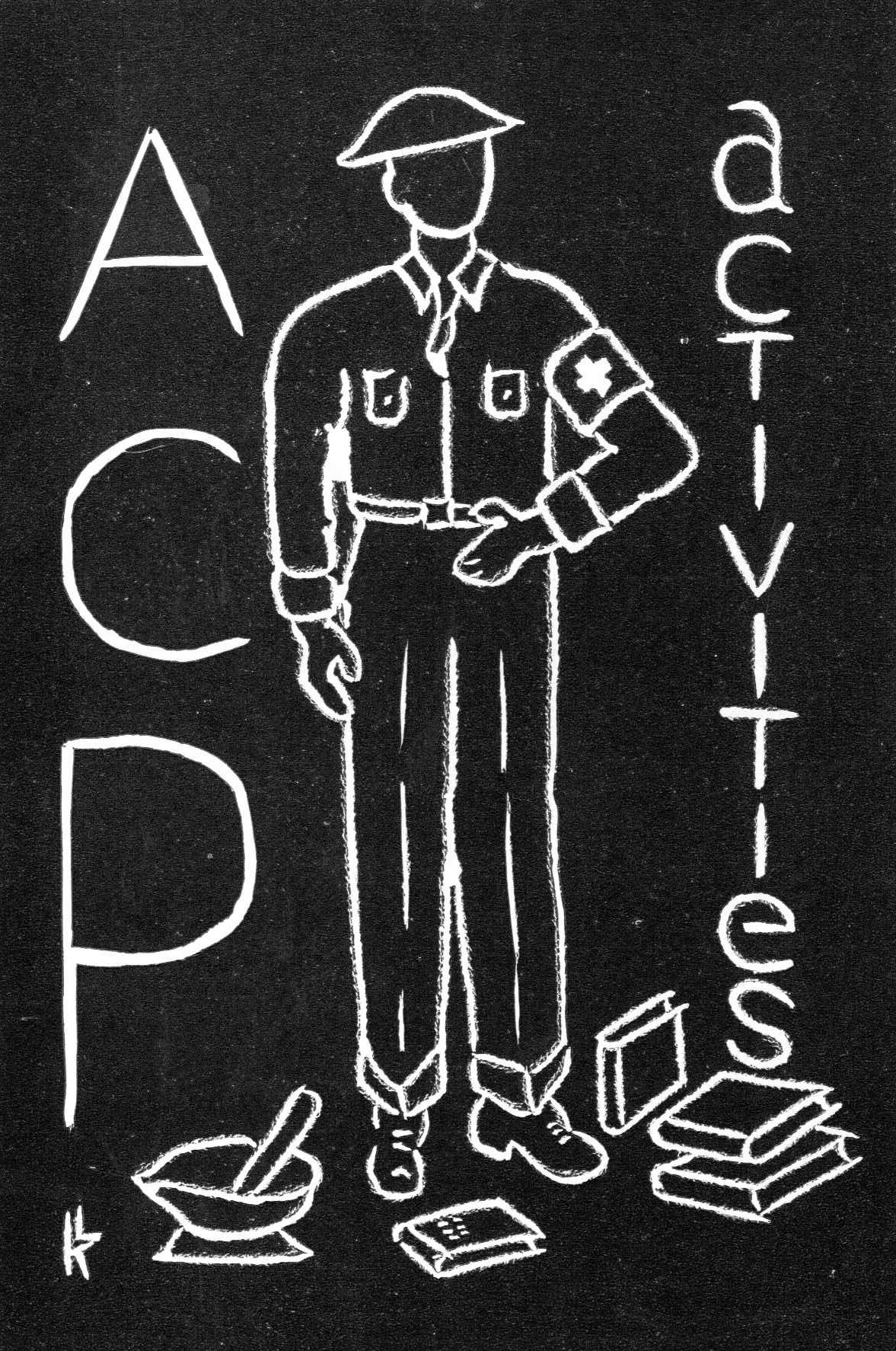
“As the hour rapidly approaches when we, members of the Class of 1942, will depart from the comparative tranquility of academic life and enter a world at war, we can but wonder what awaits beyond the horizon.” – Foreword of the 1942 Yearbook
The 1940’s were a hard decade for the College. Already struggling to stay afloat in the aftermath of the Great Depression, WWII saw many students drafted and enrollment numbers dwindle. The class of 1943’s curriculum was accelerated to allow for a January graduation, giving students the chance to complete their coursework before entering active service.
Once the war was over, ACP’s ranks swelled with ex-servicemen. Half of the freshman class in 1945 were veterans and 42 percent of the male and female students were married.
Walter Singer graduated in 1948. He would go on to succeed Dean O’Brien upon his retirement. Singer would serve as Dean of the College until 1982.
1950’s
Rinaldo DeNuzzo, Class of 1952
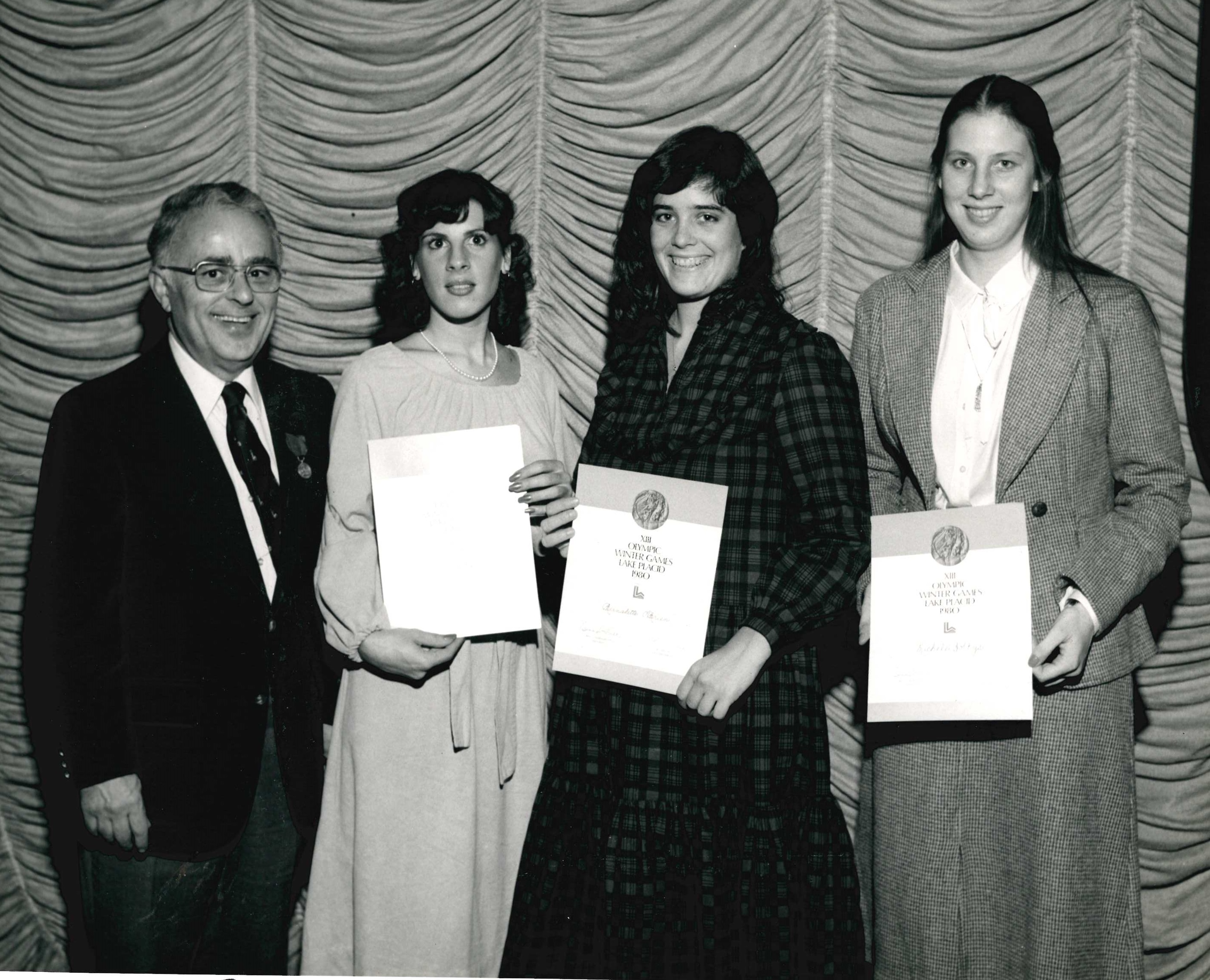
A full professor at ACP for 58 years, DeNuzzo was affectionately nicknamed “Prof” by his students. He also practiced clinical pharmacy up until the last three years of his life and held pharmacy licenses in several states.
DeNuzzo served his country as a member of the U.S. Congressional Review Panel on Prescription Drug Payments, as Coordinator of Pharmaceutical Services for the XIII Winter Olympic Games in Lake Placid, and as chair of the NYS Dept. of Health's Ad Hoc Advisory Committee.
He served as Regent of the Kappa Psi Pharmaceutical Fraternity, and a regular radio talk show guest on WGY's "Ask the Pharmacist.".
Selig Corman, Class of 1958
After graduation, Corman began his long career in pharmacy, eventually taking responsibility for Lincoln Pharmacy, which was established by his father, who was also an ACP graduate, in 1935. He continued to operate the pharmacy and care for his customers until 1988, when Corman sold Lincoln Pharmacy, though it still remains in operation today. Corman created the position of Director of Professional Affairs at the New York State Pharmaceutical Society where he served for 23 years.
Corman was committed to serving his community. In 1973 he joined the board of directors of the Trinity Alliance in downtown Albany, an organization committed to lifting up the lives of so many people in Albany's South End neighborhood. He served on that board for over four decades, ultimately being awarded a Lifetime Achievement Award from Trinity and later was awarded a Jefferson Award from the Times Union for his service to the community through his work with Trinity.
1960’s
Thomas Alpert, Class of 1967
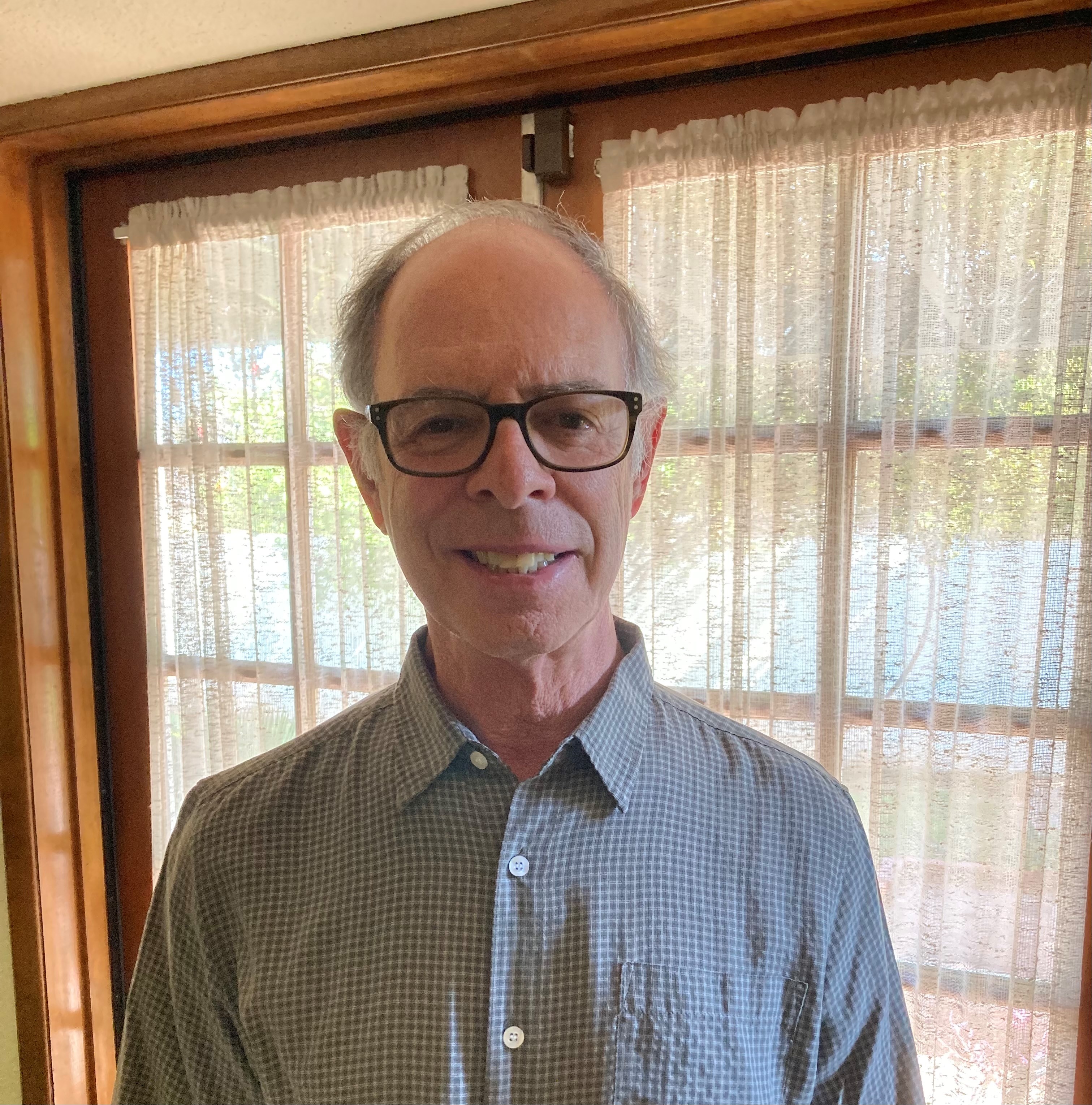
How have you used your degree in an unconventional way?
After graduating from ACP, I became interested in hospital pharmacy, so that’s where I started, doing rotations at Albany Med. A few years later, I went to grad school at the University of Michigan to get my PharmD. Then, back in ’76 there was a shortage of physicians, so I went through a physicians training program and became a pharmacist practitioner. I did half time clinic and half time pharmacy. I also attended asthma/allergy seminar and became very interested in that area. I shadowed along with another practitioner to learn about what he did and using my own experience, I was able to help his patients.
How did your education prepare you for your career?
My education of compounding and residency helped when me when I was working at Einstein Pharmacy in Albany during my time at ACP. Working there also gave me the opportunity to gain patient contact. My practitioner training allowed me to meet all types of people and learn all types of skills. Even now when I go to see my doctor, he knows that I was a pharmacist practitioner and how that has helped my doctor communicate with me since we understand each other.
1970’s
Edward Ullmann, Class of 1973
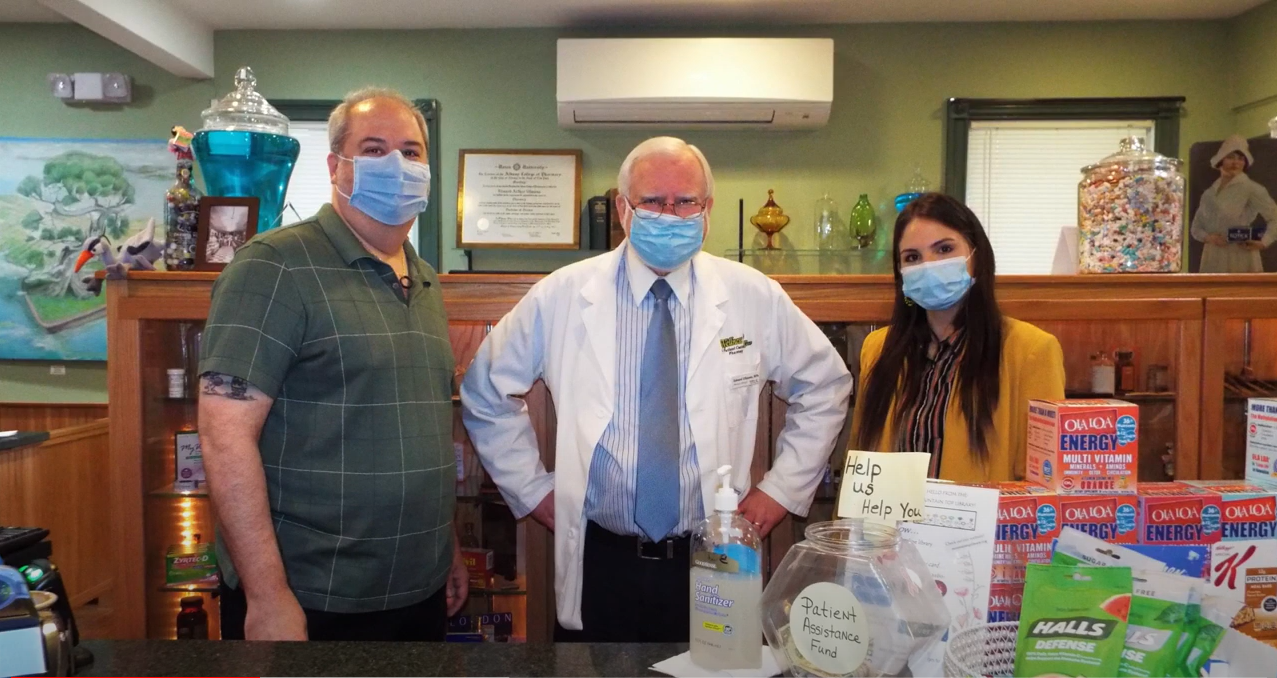
How have you used your degree in an unconventional way?
Early on I was surprised on how limited the vision of an American pharmacist was. We were formally trained at a high level, but we were never challenged to dream big. I was challenged to demonstrate the potential of a pharmacist as a professional that could use their skills to help others in many arenas. I started in community pharmacy, leveraged my experience in Student APA at ACP to become the youngest County Legislator in Ulster County at age 24, then received an MPA degree from the top public administration school in the world the Maxwell School of Citizenship and Public Affairs at Syracuse University, then became the Ulster County Mental Health Director at age 28, then became the only pharmacist and youngest recipient to be selected as a National HMO Fellow at Georgetown Medical School (co-sponsored by the government to seed the industry; one out of 3,000 applicants selected), then became the second pharmacist in the USA to create an HMO for their community (WellCare was the first HMO to enroll the poor or Medicaid population; first to provide alternative care benefits; was the second largest private employer in Ulster County seconded to IBM and was recently sold for a crazy $18 Billion Dollars), then pushed into developing the first HMO in Mexico, traveling the world to understand natural medicine, became a real estate developer of an internationally-renowned mineral lake and then back to my home in the Hudson Valley and community pharmacy.
How did your education prepare you for your career?
It gave me structure and allowed me to become a health professional. It also allowed me to share my passion of helping others by working at the Washington Park Free Health Clinic, working with heroin addicts, working with the disabled and learning about the importance of public health.
How has your role as a healthcare professional changed over time?
Clearly, the responsibility to both serve as a pharmacist that sees their patients at all ages as unique individuals and the responsibility to use whatever wisdom I have to better society at large. Pharmacists are trusted by their communities. They have the opportunity to use this trust to do great things.
How do you see your role in your community?
As a trusted leader in a small community, I see my role as follows:
- Treat all patients equally regardless of culture, background, income or life experience.
- Serve as a role model for hope. Demonstrate your values through your actions. Demonstrate the beauty of love.
- Serve as a trusted pharmacist, public health advocate, job creator, mentor and community leader.
- Being there when needed. Not just when it is convenient. That’s what the community wants to see and feel.
- Be a change agent. Feel the pulse of what is needed. Create action through volunteerism, donations and making a difference.
Kandyce Daley, Class of 1974

How have you used your degree in an unconventional way?
When I graduated from ACPHS in 1974, retail pharmacy still used manual typewriters to produce labels, a bates stamper to generate Rx numbers on the label and hard copy prescription, and handwritten receipts. In 1980, the first pharmacy computer systems were developed. I was asked by the VP of Pharmacy for Fay’s Drugs to head up our pharmacy computer project. Although this may not sound like an unconventional use of my degree today, it certainly was a first for my generation. We were charged with verifying that all programs conformed to the needs and laws of pharmacy practice in the states we operated in, ease of use for our pharmacists, and that third party plan billing was accurate. In addition, we had to create our formulary and pricing algorithms, sig codes, drug interactions, allergy alerts, and a training package for all our pharmacists. To do this, my colleagues (many of whom graduated from ACPHS) and I had to use every bit of the knowledge we learned at ACPHS.
How has your role as a health care professional changed over time?
The Pharmacist has always played a prominent role in the health of our patients, but it has grown dramatically over the past 30 years. Our retail Pharmacy practice was initially product dispensing and counseling.
We are now counselors to not only our patients, but physicians, nurses, and other health care providers. We help in drug selection, monitoring drug interactions, provide vaccinations, in depth counseling on biologicals, administering Narcan in emergencies, calculating creatine clearance for nursing home patients, etc. As a Vice President of Pharmacy, the increase in Pharmacist responsibilities requires keeping abreast of what’s happening and providing guidance, tools, and training for our Pharmacy staff. For example, we developed training programs for HIPPA, Rx error prevention, Vaccinations, Medicare advantage plan selection for our patients, RPh continuing education programs, and classes for our pharmacy technicians to help them pass the CPhT exam to name just a few.
How did your education prepare you for your career?
I was fortunate to work for Fay’s Drugs, a company whose reporting structure within Pharmacy Operations consisted entirely of registered pharmacists, from the Chairman of the Board through the staff pharmacists for all our stores. Pharmacy was so important to Fay’s, that no business decisions were made without first considering the impact on pharmacy operations. My education allowed me to advance to a number of managerial roles in Pharmacy Operations throughout the years. My ties with the college did not diminish after graduation, but were strengthened. With my role in Pharmacy representing Fay’s Drugs, we worked in concert with the college on a number of issues impacting pharmacy practice. We also recruited heavily for Pharmacists at ACPHS as well. All in all my education was an integral part of my success.
How do you see your role in your community?
Our patients look to Pharmacists for more than just medications, they see them as a source of valuable, and even more importantly, accessible advice and information. Beyond the sharing of knowledge, it also involves caring. The pandemic highlighted the caring role of Pharmacists who remained on the front line, putting themselves at risk, giving covid tests and vaccinations while filling in the numerous gaps in health care which developed during lock down. They are the source of accurate information regarding the disease and the role vaccinations would/will play in fighting Covid-19. For many, Pharmacy is the face of health care in the community.
1980’s
Darren Triller, Class of 1989
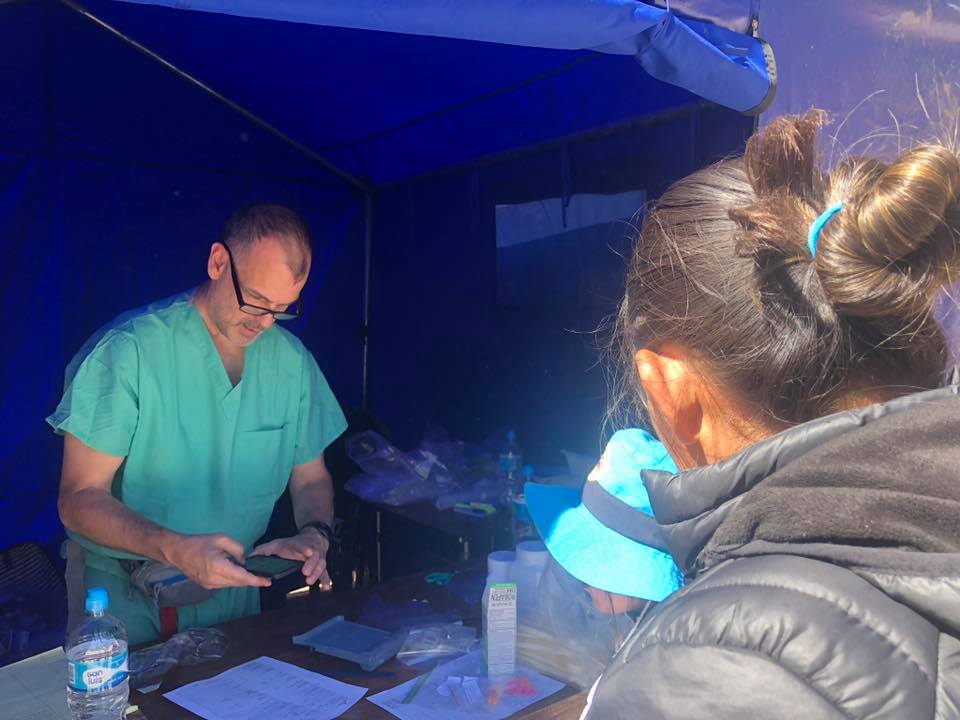
How have you used your degree in an unconventional way?
I think that “unconventional” might characterize my entire career path. After working in community and hospital settings, I returned to ACPHS to complete the postbaccalaureate PharmD program. I have since progressed through a number of unique and incredibly rewarding professional experiences. I developed a clinical practice involving home visits with the visiting nurses and later became the first pharmacist at a government health contractor (IPRO) at the inception of the Medicare Part D program. I went on to work in value-based contracting at a managed care plan, and I am now the first pharmacist employed by the Anticoagulation Forum. I’ve also had the opportunity to serve with multidisciplinary medical mission teams and my daughters in remote and underserved areas of Peru and Nicaragua.
How did your education prepare you for your career?
The pharmacy programs at ACPHS certainly gave me a solid clinical foundation for my career and my post-doctoral fellowship in home care gave me the additional skills in research and professional writing that really set me up for success in subsequent positions. As a tenure-track faculty member, I was expected to be innovative and productive, which also translated well to subsequent positions and opened additional doors. In more recent years I’ve found it valuable to continue educating myself in areas not included in traditional clinical programs, such as computer programming and data analysis. The combination of clinical training and technology skills has allowed me to get involved in all sorts of fun and impactful projects.
How has your role as a health care professional changed over time?
I think that my professional career has evolved from being initially focused on single patient encounters (e.g., single prescription or individual patient workup), to multiple patient encounters (e.g., policy and procedure implementation), to potentially all patients (through the advancement of national quality measures and care standards). It is the prospect of driving improvements in the quality and safety of care for patients at the system level that really drives me.
How do you see your role in your community?
I feel that I have commitments to the community at multiple levels. Even though I am no longer in routine clinical practice, I feel compelled to serve the global community through medical missions and related humanitarian efforts. I also have a sense of responsibility for the future of the profession. As such, I continue to serve as a preceptor and mentor to students of pharmacy. I also advocate for legislative changes and the creation of post-graduate training opportunities that will advance opportunities for our future generation of pharmacists.
1990’s
Gregory Sciarra, Class of 1993
How has your role as a health care professional changed over time?
My role has changed and evolved over the years from being the front-line clinician, to being the manager of those clinicians. From there it morphed into being the creator of new programs and services that drove improved clinical outcomes across thousands of pharmacy colleagues to today where I lead a clinical, service and sales team within the primary care space in a new and innovative value-based model that has the chance to revolutionize healthcare as it is current practiced. What I am doing today in primary care could never have occurred if I did not have my pharmacy degree from ACPHS.
How do you see your role in your community?
My role in the community is more important now than it ever has been previously. Healthcare is changing seemingly overnight, and I am at a point in my career where I can really give back to the community. I am in a role that serves medically underserved communities where access to primary care is difficult and certainly not equitable. It’s my chance to help bridge the divide around access to good quality healthcare. I also have a responsibility to help and mentor the next generation of healthcare workers very much in the same way my preceptors and partners all mentored me early in my career. Healthcare disparities still exist and have been magnified in the recent years. If through my mentorship I can help the next generation of healthcare workers understand it’s all our roles to help bridge this divide and no longer punt the issue down the road, we have a chance to truly make a lasting impact on our communities at large.
How have you used your degree in an unconventional way?
My career has been a good mixture of conventional and unconventional. After working as a pharmacist in Long Island post-graduation, I moved into management, with multiple and varied roles. The two most unique and unconventional experiences I had were when I oversaw four (4) of CVS’s acquisitions (Eckerd Drug, Savon/Osco, Longs Drug and Omnicare). In each case I was responsible for developing the pharmacy implementation and conversion plans which included systems, physical pharmacy designs, process, and workflow changes, as well as people and leadership training. Each project took about 1 year to complete and challenged me in ways I could never imagine. The 2nd was when I was the Senior Director of Finance. I was supervising a team of 200+ including professional accountants, managing an accounts receivable over $2B and managed expenses more than $750M. This role could not have taken me any further away from my conventional degree, yet multiple aspects of my degree allowed me to be successful.
How did your education prepare you for your career?
My education provided me two (2) things that were extremely valuable in my career. First it gave me confidence in the decisions I make. As pharmacy students, we are taught to ask questions, find answers, and make decisions and/or provide advice based on that information, even if sometimes it was missing or incomplete. We do not have the luxury of inaction, so we learned to evaluate all the available information, leverage available resources, and come to a decision that was best for our patients in that moment.
Second, it taught me how to handle pressure and stress. Our decisions as pharmacists often come with significant consequences. That is an enormous responsibility each of us have, and for many people, that reality could be crippling. Our pharmacy education at ACPHS taught us and enabled us to take on that responsibility and handle it in appropriate ways which allowed us to always move forward. Often in my career I had to make decisions that had significant risks and consequences and my education allowed me to evaluate those situations and make the necessary decisions when they had to be.
2000’s
Neil Mandalaywala, Class of 2008
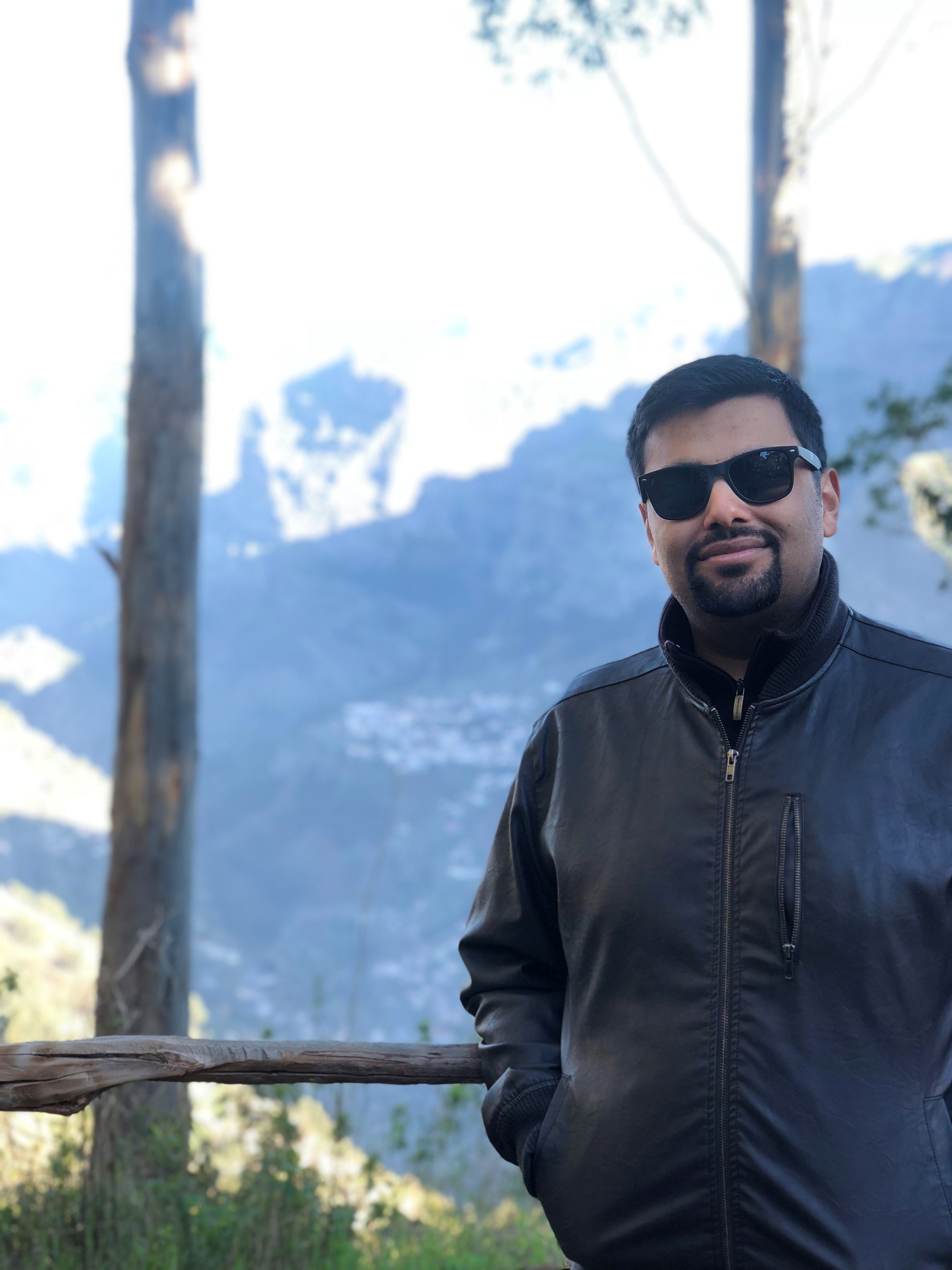
How have you used your degree in an unconventional way?
My pharmaceutical sciences degree helped lay a foundation for continued interest in learning and education. Even now in my 30s I feel capable of continuing to learn something new in sciences or arts including looking at continuing education in my career and also other degree pathways. For example, I went onto obtain a degree in acupuncture!
How do you see your role in your community?
As a leader and mentor for my patients and for my colleagues. We are all working together towards a common goal of improving health and quality of life. For myself, this is my calling, and I am incredibly thrilled that I can help guide my patients through their toughest challenges and help them overcome their illnesses.
How did your education prepare you for your career?
The pharmaceutical sciences are some of the core sciences behind health and medicine. The rigor of the curriculum made the challenges of medical school something more approachable and attainable.
How has your role as a health care professional changed over time?
In in the early parts of my career as a Pain Management physician. The field will continue to expand with time, and I look forward to learning more about pain, the human experience of it and how to obtain control over it. The most humbling and rewarding aspect of my job is that I can continue to grow and become a better physician with each day.
2010’s
Ten graduates of ACPHS from 2011 to 2018, representing both the Albany and Vermont campuses, and beginning careers in public health, community pharmacy, hospital pharmacy and industry, are the inaugural class of GOLD (Graduates of the Last Decade) Advisory Board members. They work with the Board of Trustees to provide the perspectives of recent graduates in key decisions, and they also serve as mentors to current students by sharing their experiences and advice. The inaugural class are: Venkatesh Satram ’17 (Chair); Ryan Guilaran ’18 (Vice Chair); David Denio ’11; Anthony DiSpirito ’10; Kirsten Donato ’17; Carolyn Enos ’16; Chiara Evans ’18; Megan Nadler ’11; Aniwaa Owusu Obeng ’11 and Molly Trayah ’14.
“After graduation, getting out into the field, the level of excellence that PharmDs can bring that are outside the typical role of pharmacy surprised me. The sheer talent of PharmDs that I have come across in my career is humbling, eye opening, and motivating to see the impact and the
shared passion and the capability of all these individuals.” -Venkatesh Satram ’17
2020’s
Marum Sadiq, Class of 2021
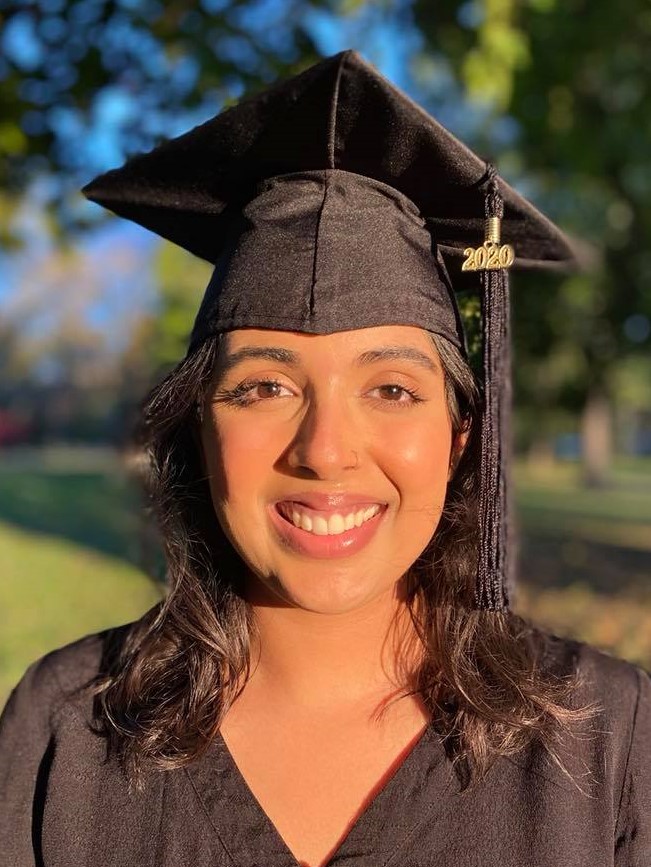
How has your role as a healthcare professional changed over time?
I've been working at the ACPHS COVID Testing Site for just over a year now and in that time I've seen myself grow into a more confident and informed professional. I've been given the opportunity to operate in many different roles in a short time. I've learned how to perform Rapid COVID tests, collect specimen, counsel patients, contact trace, and work with the data we collect.
How do you see your role in your community?
I think the most important part of my job is answering questions and providing information. With so much misinformation about COVID-19, it's important to welcome questions and have open conversations with community members. I never want people to think that there are sides to take in this pandemic. I know that everyone is capable of growing and I’m happy to take part in someone’s learning experience.
How have you used your degree in an unconventional way?
I can't really say that I've used my degree in an unconventional way yet because this pandemic has created so many opportunities to use my degree in ways that it was meant to be used. I get to use my health communication and epidemiology skills when I counsel patients and gather important contact tracing information. I’ve gotten to see firsthand how quickly policies can change and have worked to implement them at our testing site.

